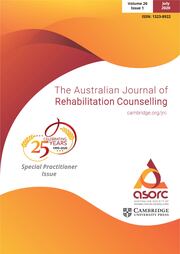Article contents
Psychological Wellbeing in Three Groups of Skilled Immigrants to New Zealand
Published online by Cambridge University Press: 15 October 2015
Abstract
The present study sought to investigate the current levels of psychological wellbeing in three immigrant groups to New Zealand. In addition, we sought to determine whether aspects of the acculturation process were related to mental health outcomes. This is a cross–sectional study from the fifth wave of annual in-depth interviews with three groups of recently arrived skilled immigrants from India, the People's Republic of China and South Africa. Interviews focused on international contacts and the migration of relatives and friends, housing, language, qualifications and employment, and social participation. Participants were also asked about health difficulties, homesickness, and whether they felt settled in New Zealand. The SF-36 Health Status Questionnaire (Ware, 1997), assessed the respondent's functional status and wellbeing in relation to four health concepts: vitality, social functioning, role limitations due to emotional health, and general mental wellbeing. The immigrant group differed significantly from the New Zealand population on only one of the four mental health scales, Vitality, with immigrants reporting higher levels. Different acculturation factors were found to predict different mental health subscales in regression analyses. Gender, home contact and health difficulty explained 22% of the unique variance in Vitality; employment status and health difficulty explained 18% of the variance in Social Functioning; health difficulty significantly contributed to the explained variance (14%) in the Role limitations due to emotional health subscale; gender, home contact and health difficulty explained 27% of the variance in the Mental Health subscale. There was little evidence for lower levels of psychological wellbeing for the three immigrant groups compared to the general New Zealand population, nor for differences between the three groups. However, results highlight the importance of differential predictors in the understanding of psychological health in migrant groups.
- Type
- Articles
- Information
- The Australian Journal of Rehabilitation Counselling , Volume 13 , Issue 1 , 01 January 2007 , pp. 1 - 13
- Copyright
- Copyright © Cambridge University Press 2007
- 6
- Cited by


